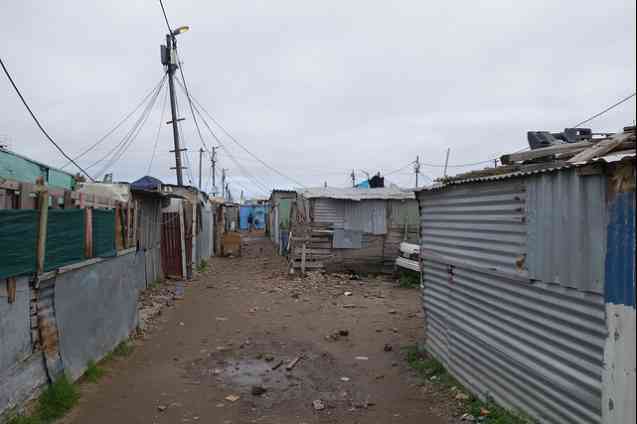Shebeens and their Beer Brewing Queens
Shebeens have a chequered past and many hold secrets and stories within their walls. They came about out of necessity – feisty, determined women, known as the Shebeen Queens – needed to make a living in the city. The underground nature was due to the laws of Apartheid South Africa.
Bottom line, though, is they’re places to meet, to socialise, and to have fun. And this is their general story, in a (very tiny) nutshell.
1927 Liquor Act
 1976 Police Vehicle, Apartheid Mueum by Joe Ross
1976 Police Vehicle, Apartheid Mueum by Joe Ross
In 1927, South Africa passed the Liquor Act that prohibited non-white South Africans from entering licensed premises or selling alcohol. The passing of the law saw the start and progression of the colourful and fascinating story of South Africa’s shebeens and the powerful (mainly) women who ran them. These are the Shebeen Queens.
Shebeen
 Masiphumelele, Cape Town by Brian Holsclaw
Masiphumelele, Cape Town by Brian Holsclaw
‘Shebeen’, the word, originated in Ireland, and was used for an illicit bar selling alcohol unlicensed. Shebeens were run illegally in people’s homes and yards in South Africa, and most alcohol was brewed on the premises, by the ‘Shebeen Queens’.
Meeting Places
During apartheid, these illegal drinking holes and meeting places were often the venue for political meetings and gatherings. It is not, therefore, surprising that they were also the target of repeated police raids and investigations.
 Passing The Bucket by Kin Nowacki
Passing The Bucket by Kin Nowacki
It was not all violence and subterfuge, though. The shebeens, while illegal, provided a place to meet, socialise and party. Many shebeens are now legal and safe to visit, as long as you travel with a reputable guide or tour company. They certainly still provide a space to meet, eat, drink and party.
Shebeen Queens
 Charlotte by Greg Willis
Charlotte by Greg Willis
So why shebeen queens? Traditionally in Africa, the women are the brewers. With the influx of people from rural to urban areas in search of work in the early 1900’s, many people found themselves faced (and still do) with an over-burdened job market and unemployment. The women – ever-resourceful – responded by opening shebeens in their houses, and brewing and selling alcohol.
These are women who took/take no nonsense. They brew, they sell, they make sure that everyone’s enjoying themselves, but that a certain orderliness is maintained, remembering that the revellers are in their homes, along with their families!
Back then, these women had to deal not only with sometimes rowdy revellers, but also violent police raids. It is said that many of the shebeen queens became friendly with the police during apartheid, and were warned before raids, allowing them to clear out the premises and hide alcohol before the raids happened.
Profitable Business
While brewing and running a shebeen back then was rife with danger, the women who ran them did it anyway and earned a good amount doing it. Many were willing to put themselves at risk, to provide for their families and ensure that they could afford an education and a resultant ‘lift’ out of poverty.
Umqombothi (The Beer)
 Langa, Shebeen by Claudia Schillinger
Langa, Shebeen by Claudia Schillinger
Traditional African beer – called umqombothi in isiXhosa – is brewed over a number of days. Recipes differ from brewer to brewer, but include a combination of maize malt, sorghum, yeast, malt and water.
Once fermented and ready to drink, it has a thick, creamy consistency with a sour aroma and, generally, a relatively low alcohol content at around 3%. Be careful, though, some can be much higher and have a real ‘kick’!
In the days when shebeens were illegal (and still now, in some places), this ‘kick’ was even more vicious – and potentially dangerous – because brewers had to brew quickly, so as not be caught. To speed up the process, they added toxic substances, such as methylated spirits.
Nowdays, of course, most shebeens stock mainstream beers and spirits.
Community & Sharing
 Beer O'Clock, Ethiopia by Rod Waddington
Beer O'Clock, Ethiopia by Rod Waddington
For all their chequered past and wild stories, shebeens have always been, and still are, a place to meet, to socialise and to share. The umqombothi is generally served in a bucket (traditionally, it was served in a calabash) and passed around from person to person.
Visiting a Shebeen
No visit to Africa is complete without experiencing this special part of its history and culture. In most cities, day tours are run by local operators which include visits to a shebeen. While many ‘modern’ shebeens have become more like taverns and are no longer in people’s houses, there are still plenty that remain ‘old-style’.
Shebeens may be tricky to find and, as with any travelling in strange places, safety should be foremost in your mind. We’d advise you to speak to your tour operator or the local tourism bureau and to go on a guided tour with someone who knows the ‘ins and outs’ of the area you’ll be visiting.
Some tour operators that do offer day trips that include visits to shebeens in South Africa are:
- Sivewe Township Tours, Langa, Cape Town
- Imizamo Yethu Tours, Khayelitsha, Cape Town
- Ezethu Tours, Port Elizabeth
- Street Scene Tours, Durban
- Soweto Tours, Johannesburg


 Briony is a qualified pharmacist, published author and travel blogger living in Cape Town. She writes her own blog about travel, the arts, music and the good things in life, with a focus on accessibility. She likes watching the world go by, and sometimes it makes her nose twitchy, but mostly it provides golden nuggets with which to light up the page.
Briony is a qualified pharmacist, published author and travel blogger living in Cape Town. She writes her own blog about travel, the arts, music and the good things in life, with a focus on accessibility. She likes watching the world go by, and sometimes it makes her nose twitchy, but mostly it provides golden nuggets with which to light up the page.





